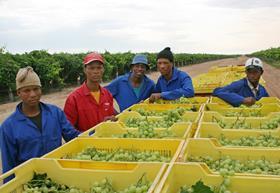
South Africa's fruit business will be free to proceed with harvesting and exporting its early table grape and stonefruit crops after the country's largest labour union Cosatu announced that strike action resumed by farm workers in the Cape regions of South Africa on 4 December had been suspended for a second time.
However, the group warned the strike would begin again on 9 January if new minimum wages had not been agreed by then.
In contrast with earlier protests in mid-November that saw violence and damage to growers' property in several fruit-growing areas of the Western Cape, this week's action is reported to have gone off peacefully.
But sources close to farm workers in some regions questioned Cosatu's right to suspend the strike, a move that suggested there were differences between what unions said and what sections of the farm worker community were thinking.
'This is the real problem,' said one seasoned labour consultant who has worked in the South African fruit industry for more than 40 years.
'The labour unions represent less than 10 per cent of farm workers and one must question whether they really know what farm workers are saying. It makes the task of negotiations so much more difficult.'
He said it was clear that something completely new was needed to fill the vacuum that has emerged and within which labour disputes could be settled: 'The old accepted system is not working anymore.'
Differing views
Representatives of South Africa's agricultural sector body Agri SA issued a statement confirming they had been unable to agree with labour groups on a legal framework to tackle issues raised by the strikers.
'Nonetheless, Agri SA remains committed to constructive dialogue,' the group said.
Leaders from the fruit sector itself convened a high level meeting in Paarl, where they discussed an earlier proposal tabled by grape grower body SATI calling on the business to accept a new interim minimum wage of R100 per hour in exchange for industrial action being suspended until the end of March.
The SATI proposal caused some consternation in the fruit industry and was soon withdrawn, even before the Paarl meeting started.
However, it illustrated for the first time that there were differing views at industry level about how best to move ahead.
'In the end, unity prevailed, but not before some heated debate,' commented one insider.
Back to work
During the resumption of strike action on 4 December, police and the farming community were on high alert across the Cape.
While farm workers gathered for protest marches in several places and work attendance varied between 30 per cent and 90 per cent, there were said to be no major problems.
With the protests now suspended until 9 January, growers and their workers are therefore free to proceed with packing and shipping their fruit as the tension, they hope, diffuses over the coming month.
In certain circles the postponement of the strike after just one day has been interpreted as a clear sign seasonal workers want to get on with earning money they can ill afford to forego.
Moving in
Over the last few years, increasing numbers of people seeking seasonal employment have taken up residence in and around the fruit regions.
In the Hex River Valley, for example, outside De Doorns where the first violent demonstration of November's unrest took place, a sizeable township has sprung up.
One grower told Eurofruit that many people from countries immediately to the north of South Africa – including as far away as Uganda – had swelled the workforce offering its services to grape growers in the region.
When the influx of foreigners began, xenophobic attacks carried out by members of the local population meant that, for many months, foreigners had to be housed in a refugee camp on a local rugby field.
Whilst it is increasingly difficult for growers to secure enough skilled labour for the very specific tasks involved in seasonal farming, it also remains true that there is an oversupply of unskilled workers.
'We have people arriving on our farms daily looking for work,” said one Hex grower.
Unfinished business
Agri SA, meanwhile, has underlined its belief that the minimum wage is nothing more than a minimum and that real wages would preferably, and in most cases are, higher than that rate.
'Applicable wages must be negotiated at farm level because practices and circumstances differ between farms,' it stated.
'Performance bonuses should increasingly be used to supplement income and policies should be applied which could enhance agriculture's profitability as well as the sector's ability to provide quality employment opportunities on a broad basis.'
The thorny issue of employee wages will clearly remain on the table as the fruit industry works its way through the festive period and into the new year.
With their minds focused on gathering, packing and exporting their crops, thoughts of the instability that may still be ahead of them cannot be altogether ignored.






No comments yet